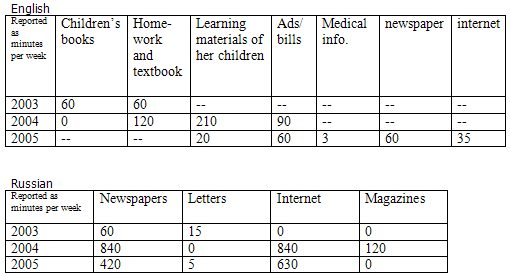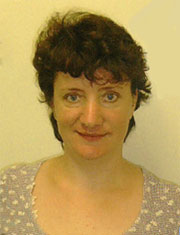On several occasions, Larissa remarked on the connection between working outside the home and English language use. She notes the paradox: on one hand, a person needs enough English proficiency to get a job (Click to View) (Requires Internet Explorer) while on the other hand, having a job working with English speakers (like her husband) is an effective method for gaining fluency in English (Click to View) (Requires Internet Explorer).
There are other contexts for English language use outside the home, however. Larissa mentioned in her 4th interview (2006) that her husband does most of the shopping.
| IR: | Ok, where else would you use English? Shopping? | |
| Larissa: | Not really. Mostly my husband goes shopping. | |
| Hide Conversation | ||
Although she had developed enough consumer knowledge to mention the names of food market chains as well as frequent buyer cards (Click to View) (Requires Internet Explorer), she reports that she shopped at a Russian market very close to her house (Click to View) (Requires Internet Explorer). The lack of use of English outside the home is also seen in her dealings with medical issues. Larissa reports using interpreters at medical clinics but more often, she says that she goes to the doctor on Wednesdays, her husband's day off, so that he can use English with the doctors and staff.
| Larissa: | Sometimes I need to speak English at the doctor's. Most of the time my husband comes with me to an appointment. He has Wednesday off, so we try to schedule for that day. But for some appointments I need to go without him. So, I take a bus and go. And, I do understand some things, especially when we go to see my daughter's dietician. | |
| Hide Conversation | ||
In terms of literacy, there is a shift away from English language literacy to more Russian literacy. The two charts show the number of minutes per week that Larissa spent with English and Russian literacy.

The tables show how the minutes of engagement with English language literacy peaked in 2004. The two charts show the shift in her literacy use coinciding with the end of her formal classroom study of English (December, 2003). In 2004 and 2005 her reading in Russian (newspapers, magazines, and the internet) increased dramatically. She reports that she used the internet mostly to read Russian news. She reports also watching Russian television except for the news which she watches nightly in English.
| R: | How about watching TV? Do you watch English-speaking channels? | |
| Larissa: | We hooked up Russian TV, so I watch mostly those channels. Though, I do watch news in English. | |
| Hide Conversation | ||
Social Circles
Her social circle has become exclusively Russian once she stopped going to class. It is focused on her Russian church and four other Russian families that they met at their church.
| IR: | Do you feel connected to any different communities in Portland? | |
| Larissa: | Mostly it's our church. And, we're friend with 4 other families from there. We meet often - for New Year's, birthdays, etc. | |
| IR: | Are they all Russians? | |
| Larissa: | Yes. Our church is big - 500 people. But we're close to these 4 families. We're about the same age and our children as well about the same age. We have many common interests. | |
| IR: | And, when you go to church, do you mostly speak English or Russian there? | |
| Larissa: | Our church is Russian, but quite often preachers say certain phrases in Russian and right away in English because people used to hearing them in English. It's easier to understand. | |
| IR: | So, do you have translators there? | |
| Larissa: | No, the preachers speak both languages. A lot of young people in the church have a better understanding of English than Russian, that's why they incorporated English phrases. So, everyone can understand. | |
| Hide Conversation | ||
